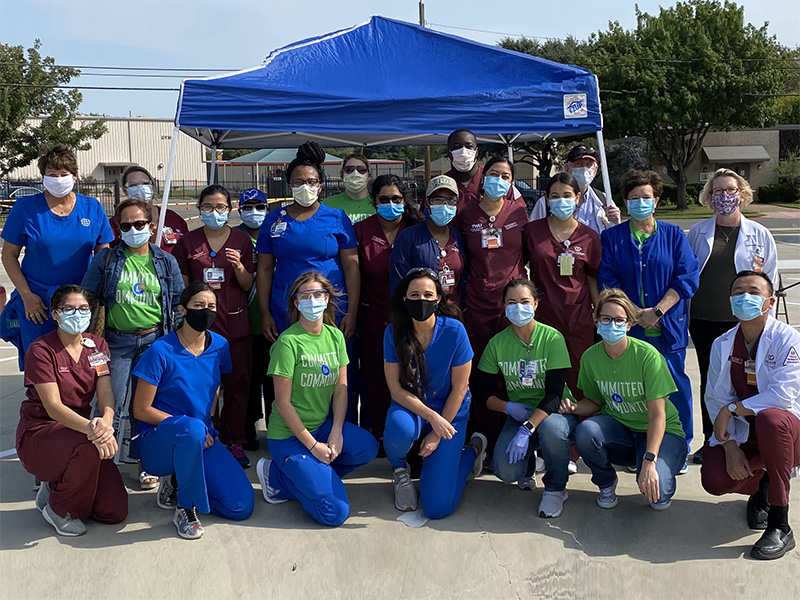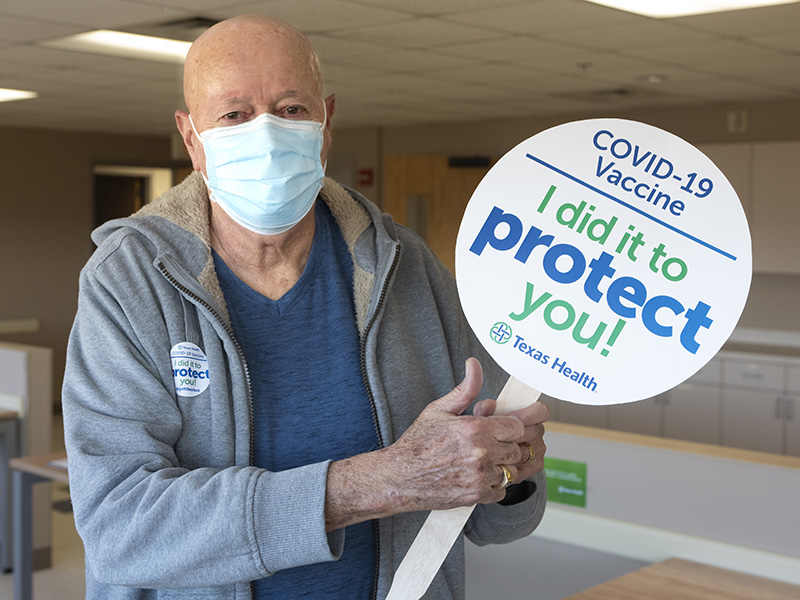-
Texas Health Community Impact
Texas Health Community Impact brings together agencies from different sectors – education, healthcare, government, grassroots organizations and others – to make measurable change in communities where social determinants of health contribute to poor overall health. Our investments are designed to improve the health of the most vulnerable and underserved. Our efforts are currently focused on connecting people to appropriate resources that help address depression, anxiety and food insecurity, which worsened during the pandemic.
-
Wellness for Life® Mobile Health Program
Texas Health's Wellness for Life mobile health units have been delivering cancer screenings and other healthcare services to medically underserved communities and people in North Texas for more than 26 years. Our team of family nurse practitioners, registered nurses and mammography technologists provide prevention and early detection services, teach evidence-based practices and deliver COVID-19 vaccinations in partnership with community-based health clinics.
Program staff, many of whom are culturally and ethnically diverse, have built strong relationships with community members by serving them where they live, work, play and pray. Our long-term presence in these neighborhoods has given staff insight into cultural barriers that commonly impede care delivery. Community health workers also foster trusting relationships, which put individuals at ease and allow our staff to provide services where they are needed most.
-
Community Health Ministry
To address healthcare equity in underserved communities and address social determinants of health, Texas Health is launching a Community Health Ministry strategy in collaboration with faith communities. These communities have long been providing resources and support to individuals in need of food, transportation, healthcare and other essential services.
Congregation leaders have built relationships with their members based on the unique understanding of their cultures, beliefs and needs. Likewise, through our Faith Community Nursing program, registered nurses and volunteers have provided education, resources and places for healing at diverse communities of faith for nearly 20 years.
The Community Health Ministry strategy will apply a collaborative approach to support faith communities to reduce health disparities in North Texas. Guided by our Community Health Needs Assessment, Texas Health will strategically expand and develop partnerships that support and meet the unique needs of the faith communities we are blessed to serve.
-
Health to Home
Texas Health Presbyterian Hospital Dallas is collaborating with CitySquare and the Austin Street Center to break the cycle of homelessness by addressing their chronic health issues. Through the 24-month Health to Home program, homeless individuals discharged from the hospital receive short-term residential care at Austin Street Center along with medical and social support services. Once they recover, CitySquare helps these individuals become self-sufficient by helping them find permanent, stable housing.
A study of existing medical respite programs has suggested that homeless patients who received this service experienced up to 50% fewer hospital readmissions within 90 days, reducing healthcare costs and homelessness.
-
Healthy Education and Lifestyles Program (HELP)
HELP treats underserved and uninsured individuals with diabetes, hypertension, congestive heart failure and high cholesterol to reduce avoidable costs and improve their health outcomes. Participants meet individually with a mid‐level practitioner and complete, review and discuss important lab tests. To improve health literacy and outcomes, we provide health education, host support groups and deliver mobile services to help participants take an active role in their own health.
-
Sexual Assault Nurse Examiner (SANE) ProgramEach year, more than 2,700 individuals seek care at a North Texas hospital after being sexually assaulted. Texas Health’s SANE program offers private forensic examination suites and trained, compassionate nurses who collect forensic evidence to aid in the prosecution of perpetrators. We also provide in-person and virtual education, training and professional development services related to sexual assault and abuse.
-
YES Dallas Initiative
Texas Health was the only health system in the nation awarded an $800,000 grant from the U.S. Department of Health and Human Services Office on Women's Health for the Federal Youth Engagement in Sports (YES) initiative. The program is designed to improve physical activity and eliminate barriers to play for racial and ethnic minorities and/or socioeconomically disadvantaged youth in the sixth, seventh and eighth grades in Dallas County. It also exposes high school youth to career options in sports medicine.
-
Reduce SILOS (Social Isolation and Lift Outcomes for Seniors)
Research studies over the past decade have shown social isolation and loneliness can be just as much of a threat to longevity as obesity or smoking 15 cigarettes a day. Through funding awarded to Texas Health by the AARP Foundation, Texas Health launched a three-year program in 2020 to identify and screen at least 1,000 socially isolated, low-income adults age 50 and older to educate them on health risks of social isolation. The program also connects them to organizations, resources and programs in their community that can help.
Clients are rescreened by a community health worker multiple times within 12 months to track their progress. By the end of the three-year grant, the goal is to reduce social isolation by 10%.
Providing Food, Teaching Resiliency
 Nearly half the students in the Sanger Independent School District north of Dallas are economically disadvantaged and a small percentage are homeless. When the pandemic started in 2020, many families lost jobs and necessities became scarce, especially food.
Nearly half the students in the Sanger Independent School District north of Dallas are economically disadvantaged and a small percentage are homeless. When the pandemic started in 2020, many families lost jobs and necessities became scarce, especially food.
Knowing that hungry students cannot learn, and those who experience trauma are much more likely to end up in the corrections system, the school district, First Refuge Ministries and the First Baptist Church of Sanger set out to create a program that would feed families while teaching students resiliency and work skills.
A Texas Health Community Impact program called THRIVE (Together Harnessing Resources to give Individuals Voice and Empowerment) granted the school district $300,000 to help in this effort.
"We recognize we can't make adverse events disappear, but we can help teach resiliency to help students and their families cope when life throws a curveball," said Marsha Ingle, senior director of Community Health Improvement at Texas Health.
The funding helped the school district and its community partners develop a resiliency education program. They hired a counselor, nurse and resource navigator to meet with parents and help them determine how to get the resources they need. They also opened a grocery store in the local high school to provide students with real-life work opportunities while also providing them free access to healthy food and hygiene products.
One of the program’s chief components is that students earn points to redeem in the store for doing good deeds. For example, a girl noticed another student did not have lunch and offered hers. She received points and used them to bring nutritious food home to her family.
The store also gives students control over their purchases. One young man lives with his mom and older sister and was embarrassed by the floral-scented shampoos he had to use. He went days without shampooing, wore hoodies and withdrew from others. He learned at the store that men's shampoo and hygiene products existed – and were available to him.
"The next day, he excitedly came to school and showed his hair to his teachers, saying, 'Smell my hair, I smell like a man!'” Ingle said. “It instilled pride, boosted his confidence and strengthened his engagement with others – all things that will stay with him long after this experience."
For the students who work at the store, companies like Honda donated gas gift cards as "payment" for their work.
The roughly 9,000 residents in the city of Sanger can shop at the store each week as well, extending the program's reach into the community. The program has been so successful that the story has gone viral, with coverage from Good Morning America, CNN, NBC News and The Drew Barrymore Show.
School districts throughout the nation have contacted the Sanger district about how they can duplicate the model. In 2021, Texas Health will be developing a toolkit to make the program accessible elsewhere. Albertsons Companies has already committed to working with Texas Health to expand this effort.
Flu Clinics Protect the Vulnerable While Teaching Future Caregivers

Flu affects millions of people each year, resulting in hospitalizations and deaths. In 2020, it became more important than ever to deliver flu vaccinations to alleviate the burden on caregivers already battling COVID-19.
To reach consumers with limited access to care, Texas Health's Faith Community Nursing and Health Promotion program targeted communities at high risk for both COVID-19 and influenza. They set up drive-through flu clinics during food pantry hours and other community events to vaccinate more individuals. From early October until the end of December, nearly 500 Texas Health nurses administered nearly 5,000 influenza vaccines at 65 community clinics.
To support them, Texas Health Resources University created opportunities for more than 100 nursing students to gain clinical experience at the clinics under instructors' supervision. For their efforts, Texas Health's Faith Community Nursing program was awarded Texas Health’s 2020 Community Service Award for their outstanding community outreach and volunteerism.
Therapy Dogs Calm Sexual Assault Victims
 While therapy dogs have been used for years to reduce stress and anxiety for patients, Texas Health Stephenville began piloting their use with Sexual Assault Nurse Examiner (SANE) victims in 2020. Annie, a therapy dog, recently comforted a woman who began to cry during her exam. The dog lay alongside the patient and moved in closer to allow the victim to pet her.
While therapy dogs have been used for years to reduce stress and anxiety for patients, Texas Health Stephenville began piloting their use with Sexual Assault Nurse Examiner (SANE) victims in 2020. Annie, a therapy dog, recently comforted a woman who began to cry during her exam. The dog lay alongside the patient and moved in closer to allow the victim to pet her.
The nurse said the patient immediately began to calm down. As questions became more personal, the nurse asked Annie's handler to leave the room with Annie. But the patient wanted Annie to stay.
Having to recount the details of an assault is often traumatic for victims. Annie was a great comfort to the patient and allowed the woman to speak openly without causing additional trauma. Annie knew her role and stayed focused on the patient the entire visit, making the devastating experience a little bit easier.
Keeping Students Active in a Pandemic

To help students confront social isolation and loneliness amid the pandemic, the YES Dallas Initiative created virtual, safe ways for participants to improve their physical and mental health:
- Students, their friends and families could attend socially distanced Fitness in the Park events with free yoga, Zumba and soccer clinics.
- A fitness vendor taught live-streamed fitness classes six days a week, including yoga, boxing, ballet and cardio.
- Nutrition education and cooking classes were taught virtually to help youth and their families make healthy meal choices.
In May 2020, the YES Dallas Sports Medicine Student Internship Program launched with 16 high school students from 12 participating schools. The interns met virtually twice a week with an athletic trainer to learn more about sports medicine careers.
Thanks to Texas Health's strong partnership with local corporations and universities, sports medicine professionals mentored high school interns interested in related careers. Program leaders are developing an app that allows students to access live-stream and on-demand fitness instruction. The platform also strengthens students' social experience, allowing them create chat groups, post pictures, share recipes, cheer each other and participate in fitness challenges. It will be launched in 2021.
Addressing Skepticism and Misinformation in a Pandemic
 Rampant misinformation about COVID-19's origin, impacts, treatment and vaccines has made it difficult for healthcare providers worldwide to share accurate information and get people to adopt potentially lifesaving behaviors. Also, cultural systems of belief about care delivery and treatment vary.
Rampant misinformation about COVID-19's origin, impacts, treatment and vaccines has made it difficult for healthcare providers worldwide to share accurate information and get people to adopt potentially lifesaving behaviors. Also, cultural systems of belief about care delivery and treatment vary.
Texas Health has spent decades working to build credibility and trust in North Texas communities in order to provide consumers the skills and insights they need to improve their health and well-being. These investments of time and resources are making a positive impact on our communities during the COVID-19 pandemic.
Through numerous Community Health Improvement programs and events, our Faith Community Nursing program, and the services provided in high-risk and underserved neighborhoods through our Wellness for Life mobile health units, we have been able to share critical information and resources since the pandemic began. This has helped us address common myths, answer questions and increase the number of people getting COVID-19 tests, treatment and vaccinations. It has also helped us administer our Dallas-Fort Worth COVID-19 Prevalence Study to design more effective public health strategies in the future.
Creating a First Line of Defense

Created in only four days at the Texas Department of State Health Services' request, Texas Health Community Clinics began delivering COVID-19 vaccinations in mid-January 2021 to individuals who registered with county public health departments.
The clinics gave Texas Health a new hope and prevention role in fighting COVID-19. The positive emotions that accompanied the vaccinations were clear. Sparkling eyes hinted at smiles behind masks. Laughter could be heard in exam rooms.
"You can see the hope and relief in the eyes of our patients," said Winjie Miao, senior executive vice president and chief experience officer. "My hope as we continue these clinics is that we bring not just relief, but peace of mind to our communities."
Establishing the clinics required a massive effort by departments systemwide, from Supply Chain to Community Health Improvement to the Transformation Office to Human Resources to ITS.
Well Together, a Dallas/Rockwall Behavioral Health Initiative

Tucked in the middle of an affluent community in Rockwall County, the primarily Hispanic residents of Lake Rockwall Estates have long struggled with poverty, poor housing and a lack of access to primary care services.
Texas Health awarded a Community Impact grant to Lake Pointe Church to implement a program creating access to behavioral health and primary care services that target this community's families and help position them to thrive. This behavioral health initiative, Well Together, joins Dallas County and Rockwall County grantees to provide access to free resources such as mental health education, counseling and primary health services to raise awareness, reduce stigma and promote the well-being of those in need. Other local collaborators in the initiative are Grace Clinic, Rockwall ISD and the North Texas Behavioral Health Authority.
To date, Well Together partners have equipped more than 700 community members to recognize and assist individuals in a mental health crisis, provided access to primary care for more than 1,400 clients and contributed to an estimated 64% reduction in depression.

